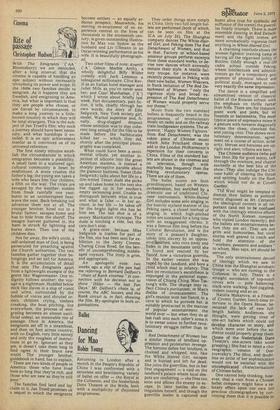Cinema
Rite of passage
Christopher Hudson
With The Emigrants (' AA ' Bloomsbury) we are reminded, after a long interval, that the cinema is capable of handling an epic subject without necessarily trivialising its power and scope. In the 1840s two families decide to emigrate. As it happens they are Swedish, and emigrating to America, but what is important is that they are people who choose, or are forced by circumstances, to make a long journey to a littleknown country in which they will be total strangers. This is the subject of Jan Troell's film: why such a journey should have been necessary, and what hardships it entailed. It is an epic achievement insofar as it convinces us of its universal reference.
The first ninety minutes establish the circumstances in which emigration becomes a possibility. A small farm in a scattered agri cultural community is beset by misfortune. A stone crushes the father's leg; the young son takes a wife who bears him four children, a fifth on the way. The crops are savaged by the weather: sodden from freak rainfalls one year, burnt in an uninterrupted heatwave the next. Back-breaking toil advances them not at all. The younger brother, hired out to a brutal farmer, escapes home and .
has to hide from the sheriff. The meagre harvest gathered in, the barn is struck by lightning and burns down. Then one of the children dies.
Not far away, the wife's uncle, a self-ordained man of God, is being persecuted for preaching against the Church authorities. The two families gather together their be longings and set sail for America.
It is the accumulation of detail that sets The Emigrants apart
from a lightweight example of the
genre like Wagonmaster. One indignity follows another; the voy
age is a nightmare. Huddled below deck like slaves in a slop of vomit and urine, surrounded by the babble of voices and shouted or ders, children crying, timbers creaking, the boat pitching, lice everywhere, the process of emi grating becomes an almost sacrificial ordeal, an inexorable rite of passage. Once in America, the emigrants set off in a steamboat, and then on foot across country, with no English, very little money and only the roughest of instructions to go by. Ignorant as they are, it doesn't take them long to find ogres in their brave new world. The younger brother, guidebook in hand, has to explain, "There are two kinds of people in America: those who have lived here so long that they're rich, and those who are new so they're still poor."
The families find land and lay claim to it. Jan Troell promises us a sequel in which the emigrants become settlers — an equally ar duous prospect. Meanwhile, his moving re-enactment of an ex perience central to the lives of thousands in the nineteenth century, is given outstanding illustra.tion by Max von Sydow as the husband and Liv Ullmann in an Oscar-winning performance as his ; wife. It is beautifully photographed.
Two other films of note: Avanti! (' A ' Odeon Marble Arch), a wholly delightful Billy Wilder comedy with Jack Lemmon a beleagured millionaire, Clive Rev ill as an Italian hotel manager and
Juliet Mills as you've never seen her; and Ciao! Manhattan. (' X ')
which I wrote about briefly last
week. Part documentary, part fiction, it tells, chiefly through her
own words, the story of Edie Sedgwick, New York society girl, model, Warhol superstar and, fi nally, drug-slugged dropout
whose ambition was to stay coherent long enough for the film to be
made before the barbiturates killed her — which they did, shortly after the principal photography was completed.
What could have been a sentimental tribute, yet another in jection of silicone into the great American mamma, is instead a sharply perceptive parable about the glamour business. Susan (Edie Sedgwick) talks about her life to a dim-witted Texan dude she picks up and takes home to the tent she has rigged up in her mother's empty swimming pool. Unable to distinguish between what is true and what is false — in her account, in her life — he takes off for the bright lights she has let him see. The last shot is of a snowy Manhattan cityscape. The dude is hitching a ride, but the cars don't stop. A grace-note: because Miss Sedgwick is topless for part of
the film, she has been sent for exhibition to the Jacey Cinema,
Charing Cross Road, for the benefit of uncomprehending middleaged voyeurs. The irony is grim, and appropriate.
An apologetic note: two weeks ago a slip of the pen had me referring to Bernard Delfont's "chain of Rank cinemas "in connection with his decision not to show 'Hitler — the last Ten Days.' Mr Delfont's chain is, of course, the ABC houses, and the Rank circuit is, in fact, showing the film. My apologies to both organisations.


































 Previous page
Previous page